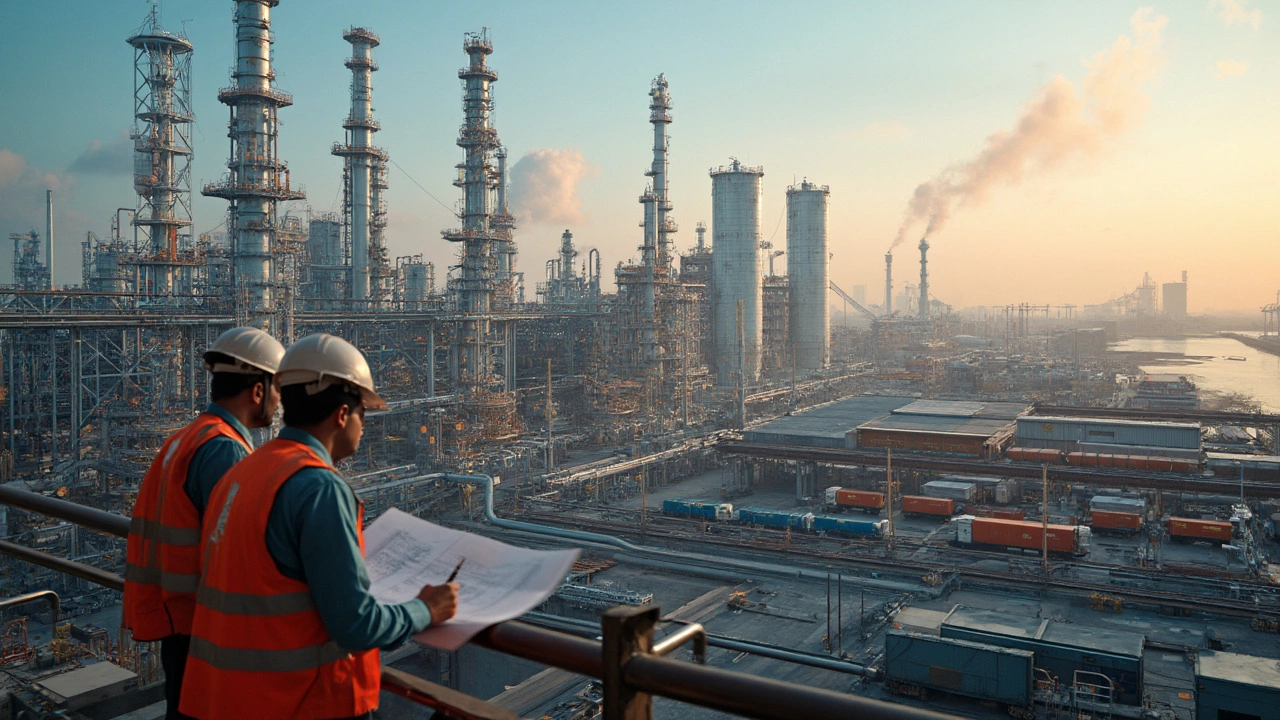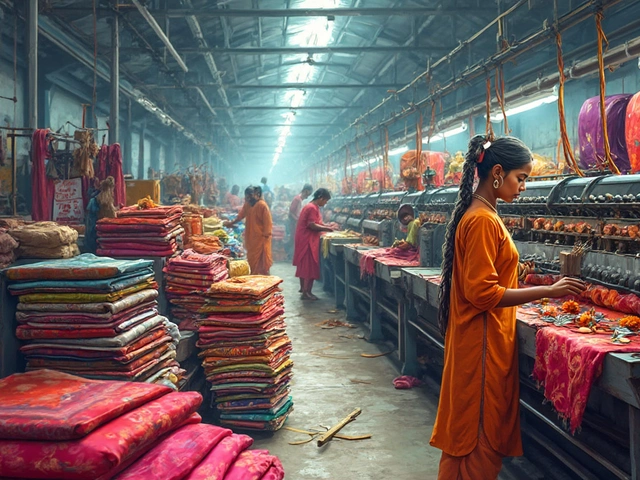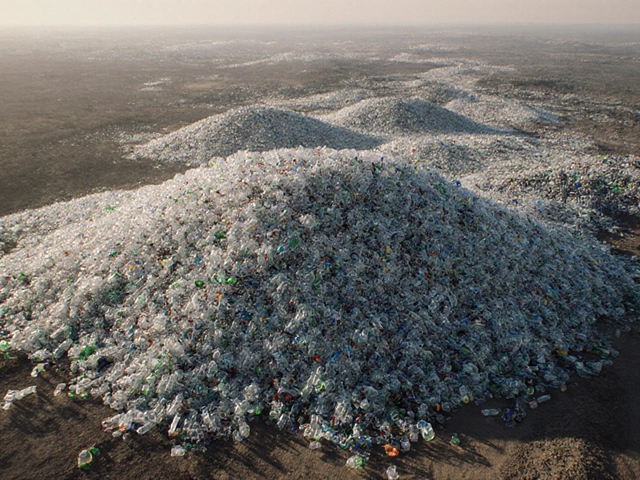If you're wondering who dominates the massive Indian chemical scene, the answer's straightforward: Reliance Industries Ltd. takes the crown as the largest chemical manufacturer in the country. We're not talking by a slim margin—Reliance has built a production engine that churns out everything from basic chemicals and polymers to complex specialties. Their Jamnagar complex is so big you could fit a small city inside. That's not an exaggeration; it's the largest refining and petrochemical complex on the planet.
Why does this matter? If you need chemicals in bulk, reliability, stable prices, or want to understand where downstream products in India come from, this is the company you wind up dealing with, directly or indirectly. Reliance’s scale means better bargaining power, massive R&D, and a serious logistics network. Want a tip? If you're comparing suppliers, check who their upstream partners are. More often than not, Reliance pops up somewhere along the chain.
- A Giant in Indian Chemicals: Who Leads?
- What Sets the Top Player Apart?
- How the Scale Impacts Buyers and Industry
- Tips for Navigating the Indian Chemical Market
A Giant in Indian Chemicals: Who Leads?
You can’t talk about the Indian chemical industry without putting Reliance Industries right at the top. If you ask folks in the field who the leader is, hardly anyone will hesitate: Reliance is by far the biggest player around. Let’s put some real numbers to it. Reliance’s chemical and petrochemical operations are not only the largest in India, but honestly, they give some global giants a run for their money.
The company’s Jamnagar site stands out—it’s the world’s largest refinery and petrochemical hub, pushing out over 33 million tons of chemicals every year. Reliance’s overall consolidated revenue for chemicals was north of $20 billion USD (about ₹1.66 lakh crore) in the 2023-24 financial year. That’s more than double the next largest Indian chemical firm.
Here’s a quick look at how Reliance stacks up with other well-known Indian chemical manufacturers:
| Company | Revenue (₹ Crore, 2023-24) | Main Products |
|---|---|---|
| Reliance Industries Ltd. | 1,66,000+ | Polymers, Polyesters, Bulk Chemicals, Elastomers |
| Tata Chemicals | 16,400 | Soda Ash, Bicarbonate, Salt, Specialty Nutrients |
| SRF Limited | 15,000 | Refrigerants, Packaging Films, Specialty Chemicals |
| Aarti Industries | 7,200 | Pharma Intermediates, Specialty Chemicals |
What’s wild is the sheer range that Reliance covers. It’s not just quantity; they’re deep into refining, polymers, polyester, specialty chemicals, you name it. Plus, because they source crude oil and process it all the way into finished chemicals on one site, their costs are super competitive. Most other Indian companies can’t match that kind of integration.
So if you’re trying to figure out who leads in the Indian chemical game, your answer’s clear. For scale, reach, and choices, Reliance Industries is in a different league altogether.
What Sets the Top Player Apart?
Reliance Industries isn’t just the largest chemical manufacturer in India because of size. It's their way of running things that makes them stand out. For starters, they control every step—right from crude oil refining to the final delivery of chemicals. This tight grip on their supply chain keeps costs down and reliability up.
Their Jamnagar facility is famous in the industry. It's not just the biggest in India—it's the largest petrochemical complex worldwide with a refining capacity over 1.24 million barrels per day. That’s a mind-boggling number. The production line covers a wide range: polymers, polyester, fibers, and even specialty chemicals. Here’s a quick snapshot:
| Product Segment | Annual Capacity |
|---|---|
| Polymers | 5.5 million tons |
| Polyester | 2.5 million tons |
| Elastomers | 1 million tons |
| Basic Chemicals | 8 million tons |
What’s really impressive, though, is their technology. Reliance adopts the latest tech to cut emissions, recycle water, and save energy. They were early with digital process automation, which keeps quality up and waste down. This isn’t just a greenwashing claim—third-party audits back up their numbers.
Here’s a quote from a 2024 industry report by ICIS News:
"Reliance Industries has maintained its market leadership in India by integrating large-scale production with innovation, ensuring both capacity and efficiency outpace all local competitors."
Scale lets Reliance negotiate big discounts from raw material suppliers and pass on savings to buyers. Their distribution network reaches every corner of India and a growing chunk of exports, too. Not sure if a supplier is the real deal? Quick tip—check if they can access Reliance’s distribution or products. If not, you might face delays or higher prices.
At the end of the day, their combo of tech, size, logistics, and supply chain control puts them in a different league than any other chemical manufacturer in the country.

How the Scale Impacts Buyers and Industry
When you’re dealing with the largest chemical manufacturer in India, things work a bit differently than with your average supplier. Reliance Industries’ sheer scale changes the rules of the game for both buyers and the broader chemical industry in India.
Let’s start with buyers. Having a giant like Reliance at the top means bulk orders aren’t a problem. Their production lines run non-stop, so inventory is always available—which is a big plus if you’re running a factory and can’t afford any downtime. Plus, their volume keeps prices more stable than you’d see with a bunch of smaller, scattered producers. If there’s a sudden global shortage or a surge in demand, a company this size can often absorb the shock better, so your supply stays steady.
There’s also a ripple effect on pricing. Because big players can negotiate better raw material prices and streamline logistics, buyers often get better value when sourcing from them or from companies that rely on their supply chain. If you’re looking for the largest chemical manufacturer India has to offer, scale almost always equals some level of price advantage—especially on commodity chemicals.
The industry as a whole benefits, too. Reliance’s top-tier infrastructure means faster, more efficient delivery and less waste. They invest huge amounts in research and eco-friendly practices. For example, their Jamnagar complex leads with water recycling and waste reduction. Smaller manufacturers often follow their lead, because if the biggest player is going green, it pushes everyone else to raise their standards.
- Reliability: Downstream businesses can plan product launches or expansion without worrying about chemical shortages.
- Standardization: Consistent quality makes it easier for small manufacturers to meet international export norms.
- Innovation: Big budgets mean more R&D, which trickles down in the form of new, better, or cleaner chemical products for the rest of the market.
In short, Reliance’s scale doesn’t just help their bottom line—it shapes almost everything buyers and other manufacturers do in India’s chemical space.
Tips for Navigating the Indian Chemical Market
Jumping into the Indian chemical market? It’s big, fast-moving, and can feel pretty confusing if you don’t know where to start. Whether you need a supplier, want to understand the pricing game, or are considering investing, a few ground rules can save you a lot of headache.
- largest chemical manufacturer India: Know who’s who. Reliance Industries is king, but players like Tata Chemicals and Aarti Industries hold their ground in specialties and exports. Check if your supplier is actually producing or just trading. This cuts out surprises later.
- Relationships make a difference. India’s market thrives on networking. If you have a local agent who gets the culture and the paperwork, your shipments move faster and haggles go smoother.
- Understand pricing swings. Feedstock costs, global oil swings, and even currency rates affect what you pay. Don’t just look at local rates; keep an eye on global trends, since major Indian manufacturers often price off international benchmarks.
- Watch for certifications. Legitimate Indian chemical companies get ISO, REACH, and other key approvals. If your buyer overseas cares about compliance, double check these up front.
Here’s a cheat sheet for the scale of key companies, so you know who you’re dealing with:
| Company | Main Chemicals | Annual Revenue (2024, USD) | Key Certifications |
|---|---|---|---|
| Reliance Industries | Petrochemicals, polymers, fibers | $115 billion | ISO, REACH |
| Tata Chemicals | Soda ash, salt, fertilizers | $3.6 billion | ISO, FAMI-QS |
| Aarti Industries | Specialty chemicals, pharma intermediates | $1.5 billion | ISO, Responsible Care |
Want to avoid shipment dramas? Always get samples, double check specs, and lean on third-party inspections for bulk deals. If you’re importing, understand Indian export rules and always factor in some extra time for port clearances. And don’t believe "ready stock" unless you get it confirmed in writing.





